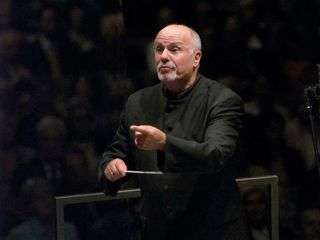|
Back
Two requiems for the price of one Zurich
Tonhalle
11/06/2010 - & November 7, 2010
Kurt Weill: Das Berliner Requiem
Johannes Brahms: German Requiem, op. 45
Lydia Teuscher (soprano), Fabio Trümpy (tenor), Florian Boesch (baritone)
Swiss Chamber Choir, Timothy Brown (chrous master), Tonhalle-Orchester Zürich, David Zinman (conductor)

D. Zinman (© Prisca Ketterer)
In 1928 Weill accepted a commission from Frankfurt Radio for a new work, which turned out to be his Das Berliner Requiem, described as a Cantata for tenor, baritone, male chorus and wind orchestra. It is, despite the contradiction in terms, a secular Requiem, based on poems by the playwright Berthold Brecht. These refer to forgotten war victims whose bodies have disappeared. Weill's scoring is sparse and poignant. His style mostly looks back to his roots; the choral writing brings Brahms to mind – and for its opening and closing Great Hymn of Thanksgiving Weill selected text from Brecht dealing with life's origins in grass and earth. Here he makes a link with “Denn alles Fleisch es ist wie Gras" from Brahms' German Requiem.
The short work – barely twenty minutes long – is, however, ultimately unsatisfying due to its very disparate parts; there is simply no musical homogeneity. It is hard coming to terms with Brahmsian chorales juxtaposed with Weill's cabaret style, here including the accompaniment of banjo and saxophones. The work is rarely played and one can see why. The chorus did their best, ably supported by the wind players of the Tonhalle Orchestra. However the horror of Brecht's texts did not really come through.
The same problem, namely poor diction, afflicted the German Requiem. I wondered whether the Choir’s usual chorus master Fritz Näf had bowed out permanently in favour of Timothy Brown, ex Clare College Cambridge music director, ex Westminster Abbey chorister. Perhaps Brown had taken the choir’s German diction too much for granted.
Zinman clearly revels in large choral works (he says one of his favourite choral works, yet to be performed in Zurich, is Dream of Gerontius. Zinman was most adept both at balancing the work’s architecture and its firm musical structure and controlling the choir and soloists. But some of the sense of drama was missing. The chorus impressed, as it usually does, both in terms of volume and tone. But one was not left pondering the inevitability of man’s fate, the transience of human existence. “Death, where is thy sting?” lacked bite.
The soloists were less impressive than the chorus, particularly Lydia Teuscher, the young German soprano, who sounded nervous throughout. Florian Boesch had a warm tone but lacked expression.
In a review earlier this year I mentioned that the Schweizer Kammerchor, Switzerland’s only semi-professional choir, was in financial difficulties having lost its major sponsors; I gather that whilst they are honouring their current commitments until the middle of next year, their future remains in jeopardy – neither the Swiss State nor any Swiss canton or town is willing to sponsor them. They are collecting signatures and will have to petition for their very survival. They do not deserve to be disbanded.
John Rhodes
|